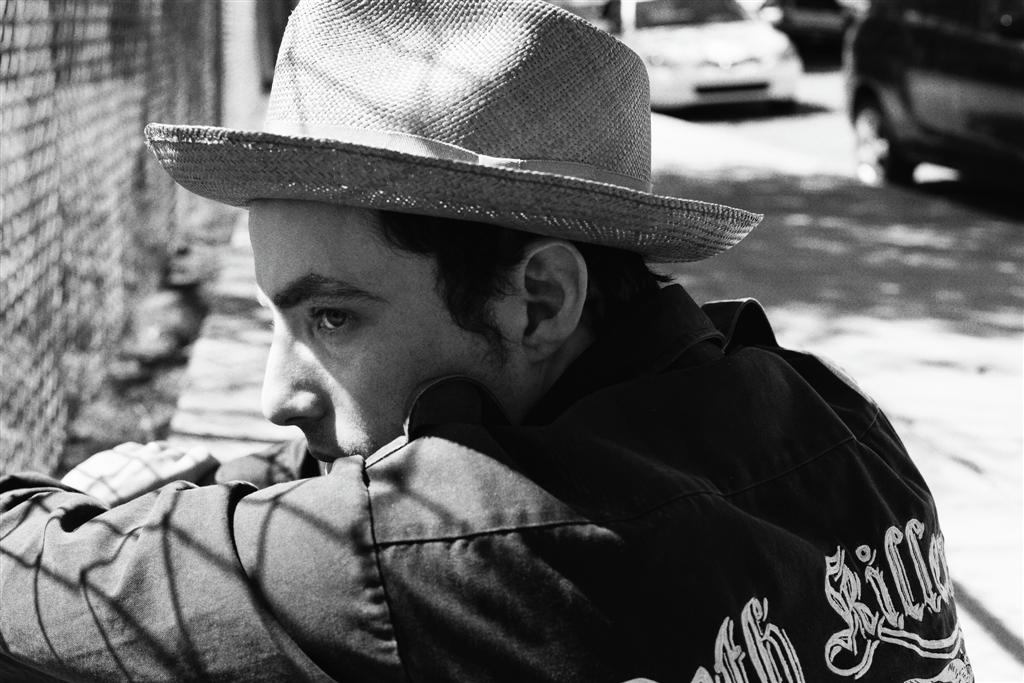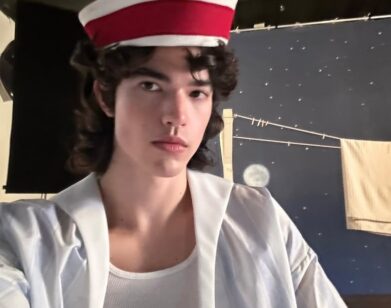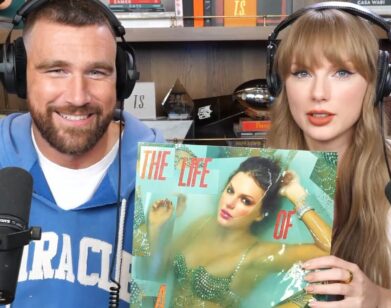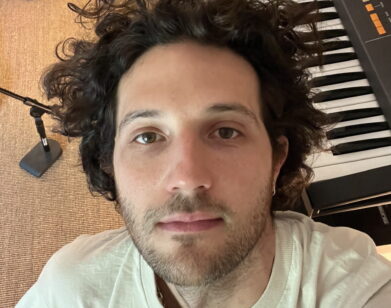Jakob Dylan
Jakob Dylan and I first met in the early ’90s. I was working in the music business, finding and developing new talent, and a mutual friend slipped me the new demos that Jakob and his band, the Wallflowers, had just finished recording. I was struck by early versions of “6th Avenue Heartache” and “Angel on My Bike”—both of which would later appear on the Wallflowers’ breakout record, Bringing Down the Horse (1996)-and asked him to lunch. We never worked together, but became, and have remained, close friends, even as I left the music business to become a filmmaker and as he went on to enjoy enormous success with the group. The two of us sat down recently at a Four Seasons Hotel in Los Angeles to talk about his new album, Seeing Things (Columbia)—at the age of 38, his first record as a solo artist—and why being a songwriter means so much to him.
BRIAN KOPPELMAN: What struck me when we first met is that even as a young man, you had a seriousness of purpose about the craft of writing songs.
JAKOB DYLAN: I always saw songwriting as the top of the heap. No matter what else you were going to do creatively-and there were a lot of choices-writing songs was king.
BK: I remember when we would talk about other musicians. It’s like you viewed being a musician as a calling really, where you have to apply not just talent, but rigor and discipline, to figure it out. Do you think you’ve always had a disciplined approach to making music yourself?
JD: Yeah. I mean, I’ve always had this disciplined approach to it. You have to have a work ethic and you have to be educated in what you’re doing. You have to take it seriously. It doesn’t mean that everything you do has to be serious. But you’ve got to have the tools. There are certainly a lot of people—and I won’t name names—who are getting by simply on expression. And I guess that’s valuable in some sense. But songs are not better just because they’re emotionally honest. To write a song well, you have to put some work into it and grind it out.
BK: In that context, it’s interesting how often you use farming imagery, workingman imagery, in your songs. On Seeing Things, you sing from the perspective of a farmer in “All Day and All Night.” In “Mourning Train,” a song on Breach [2000], the singer is a regular guy who’s grown up doing a regular kind of work-
JD: You don’t think of me as a regular guy?
BK: I think you’re a regular guy, but you’re not a migrant farmworker.
JD: I come from farmland-well, not in the traditional sense of soil and carrots.
BK: Yeah, you haven’t been working the farm and waiting for the custom cutter to come.
JD: I toil. [laughs]
BK: Here’s what I think: You don’t really want to say it, but you believe that the job of the songwriter is not that different from the job of the guy out there on the farm, in that if you’re doing it right, you’re putting your back into it.
JD: I do look at songwriting as a lot of work. I don’t overintellectualize music as a special medium that only some people deserve to do. I think it’s something you do if you put the work in.
BK: There’s this idea in some of your songs—even the ones like “Invisible City” [on Bringing Down the Horse] from before you were famous—of being misperceived as somebody who looks right for the part and who, as the son of Bob Dylan, has the lineage and therefore has had some sort of an easy road. It’s annoying to you, right?
JD: Right.
BK: Do you think that your particular work ethic is, in part, a reaction to the way you initially worried about being perceived?
JD: Maybe part of it is reactionary. Maybe that allows me the freedom to keep moving and going forward.
BK: Aren’t you sort of in uncharted territory? There have been other kids of musical icons, like Julian Lennon, who have had hit records, and others, like Teddy Thompson and Rufus Wainwright, who have careers. But it’s very easy when you’re in that position to kind of get swallowed up by the burden of expectations. And you’re still out there battling your own success, your father’s success, the burden of history, and an enormous legacy. Do you feel like there’s anyone else out there in your position?
JD: I relate more to the descendants of Galileo and the Wright brothers than I do to anyone else you might mention. If you could name someone working today who I could relate to, I’d be both surprised and thrilled. To be fair, we’re talking about apples and oranges here.
BK: So clearly, you agree with the popular evaluation of your father’s body of work.
JD: Absolutely—well, of course.
BK: I can’t imagine how that situation is not paralytic for you.
JD: You know, if I really stop and think too much about it, I would probably go find a job on that farm that you’re talking about. But I can’t. Here’s what I know: There’s room for both of us. The songs I write should only be gauged by what other writers or peers are doing today. If the barometer for all songwriters was to match his body of work, then anyone you might mention alive or dead is a failure. But I’ve learned to not be too hung up on what’s fair or not fair.
BK: But I would say that you’re signaling on Seeing Things that for the first time you’re comfortable with who you are. This is your first real solo album, and in its presentation, form, and heritage, it is similar to your dad’s early ’90s traditional folk albums, Good As I Been to You [1992] and World Gone Wrong [1993]. I think that on those liner notes your father wrote for World Gone Wrong, he threw down the gauntlet by saying, “There won’t be songs like these anymore.” He wasn’t even saying he did it anymore-he was just covering these songs.
JD: Yeah. But, you know, that kind of music you’re talking about, nobody does do that anymore. It’s not available anymore. If it’s too heavy-handed, it’s not going to reach anybody.
BK: Listening to Seeing Things, it’s clear how important the words are to you—and some of the names you invoke and words you use are very interesting. I played the record for my screenwriting partner, David Levien, and I pointed out that you had used the name “Delia” in a song. David said, “Yeah, ‘highlands,’ too.” And we started talking about the fact that these were names and words your father had famously used, that were really associated with him. As smart and savvy as you are, you know the effect a word like “Delia” has on certain listeners.
JD: Yeah. But, you know, I’m allowing myself every opportunity, every tool that every other artist should allow themselves to use. If anybody expects me to not use certain language or certain words, like I have some kind of penalty restriction, it’s completely unrealistic. . . . Folk music is not for a select group of people who feel that maybe he taught them about this music and that it belongs to them. It doesn’t belong only to them. It belongs to everyone who’s interested in the blueprints of good songwriting.
BK: But they’re saying, “Hey, wait. Bob Dylan led me to this kind of music—”
JD: Yes.
BK: “. . . and it’s his and ours.”
JD: Yeah, exactly.
BK: “And it’s nobody else’s.” And you’re saying-
JD: I’m saying, “It’s mine, too.” This is common language. Those words have been around in folk songs for as long as you can remember, and because maybe he made those songs more memorable to certain people. . . . I mean, really, just get inside of what people would be asking: That I not use these certain things in my music. Look, if you go scrounge through those old records, he has been using imagery that’s been around for many, many years.
BK: But when you do it, it signals something else.
JD: Yeah, I’m aware of that.
BK: In a way it’s saying, “Those insecurities that I had at one point don’t apply anymore.”
JD: Yeah, they don’t apply anymore and I mean business. And if you mean business in songwriting, you’re listening to that material.
“I relate more to the descendants of Galileo and the Wright brothers than I do to anyone else you might mention.” Jakob Dylan
BK: Do you think that we’re living in particularly bad times?
JD: I think that these are different times, and different things are available to artists, and certain things have become passé. You’ve already seen the outcome of a lot of things that seemed to have a lot of potential. We’ve already had Country Joe McDonald sing about Vietnam. We’ve already heard that, and I can’t tell you if it made a difference or not. But we already know that artists can do that, and they shouldn’t feel threatened by doing it. They’re probably not going to change the world. They’re going to change a few people’s perspectives and maybe make somebody’s day at times, if they can. But they’re not going to put somebody new in the president’s chair. It’s all worth the effort; it all needs to be done. But I don’t look at songwriting as having the ability to necessarily do that today. We were already shown by some of the best songwriters ever that they gave up on that dream, too, and a long time ago. I’m talking about the ’60s really. People go interview these guys and ask them, “Do you still think music can change the world?” I mean, go talk to Graham Nash about that. What’s he going to tell you? Ask David Crosby. These guys are still out there. They’re playing their hits at Staples Center and those are really valuable songs—
BK: You don’t mean just Graham Nash and David Crosby, though. You mean—
JD: Well, I’m talking about a couple of the guys who got knee-deep into really believing music had a great service beyond radio. I believe it did. And I think a lot of those songs are great. I could name a lot of people.
BK: Neil Young is there trying to change things.
JD: Yeah. But he’s one of a kind. He’s a maverick. That record he put out in 2006, Living With War [Reprise], was everything people would have said was revolutionary about those records that came out in 1968.
BK: Do you feel like your album is a war album?
JD: It deals more with humanity than the actual war. I don’t want to sing songs and write songs that need to have images behind them that are of a specific time. The times we live in today-I mean, there’s a lot to work with. But I think that if I was my age in 1975 or 1985, I would have felt the same way because that’s what I gravitate toward.
BK: You have this line on the song “Sleepwalker” [on Breach]: “I’m an educated virgin.” I interpreted it to be a comment on the fact that some people might assume that because you grew up around fame, you somehow knew what it would be like to be in the public eye.
JD: What I meant by that line, more than anything, is that, of course, I came up around music and fame, but this is still my first time experiencing it all. I’m still going through it like anybody else goes through it. You’re right-I do know more about it than most people, for the obvious reasons. But I’m still doing something I’ve never done before.
BK: It’s been more than a decade since Bringing Down the Horse came out. Are you more comfortable now being famous for being who you are?
JD: Ugh . . . yeah. I mean, I don’t have a problem with it. I’ve never seen that much of it as that big of a challenge. I don’t think that highly of it. I don’t worry about it. I don’t pretend it’s important. Am I more comfortable with it than I was, like 15 years ago when I was first starting out? Uh, yeah. I’m just more accepting of it.
BK: But most musicians grow up wanting to be heard, right? I know that you don’t care about the trappings of fame, but it is important to you to get lots of people to hear your music.
JD: Of course. I’m not interested in this record, Seeing Things, being my secret. But I also know that it’s not for everybody. And a lot of people probably won’t like it. But that’s the nature of music. I’m realistic. Getting to everybody is not the goal here. The people you can affect in any way-that’s who you want to get to.







